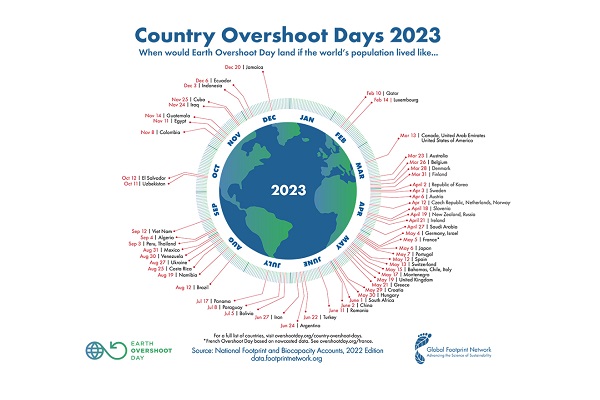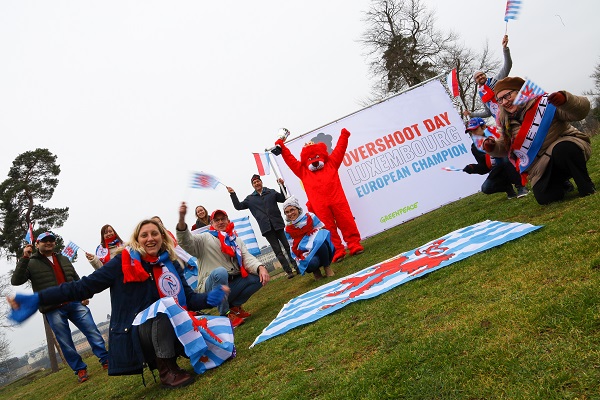 Credit: National Footprint and Biocapacity Accounts
Credit: National Footprint and Biocapacity Accounts
In addition to 14 February being Saint Valentine's Day, this date (in 2023) marks Luxembourg's "overshoot day", i.e. the date on which Earth Overshoot Day would fall if all countries consumed as many natural resources in a year as the Grand Duchy.
Every year on 1 January, the Global Footprint Network publishes its country overshoot days as part of the National Footprint and Biocapacity Accounts, based on calculations made using the previous edition of the publication; the 2022 edition covered data from 1961 to 2018. According to the publisher, there is a time lag between the latest data year and the latest edition year, related to the United Nations' reporting process, and so estimates have to be made.
These country reports indicate when Earth Overshoot Day would fall if the global population consumed as much as certain countries. In Luxembourg in 2023, the planet's resources for a year would have been already exhausted by 14 February - the earliest overshoot day in the world after Qatar (10 February) and the earliest in Europe. The second earliest overshoot day in Europe would be 26 March, in neighbouring Belgium.
This implies that if humanity consumed as much as the Grand Duchy, eight planets would be necessary to sustain this consumption.
Local non-profit organisations such as Greenpeace Luxembourg and Mouvement Ecologique have expressed their concerns over this poor performance. Greenpeace recently decided to "highlight the absurdity" of this situation (Luxembourg being the worst performer in Europe) by presenting the heraldic animal of Luxembourg, the red lion, with a trophy (pictured below) which "represents the tireless efforts of the country's economy to destroy the future of the young generations."
Greenpeace also cited a recent European report on renewable energy which revealed Luxembourg to be the worst performer in this area in Europe in 2021. The non-profit argued that the country still relied too heavily on nuclear and fossil fuels. "Because of its lower taxation on fossil fuels and fuel in particular, Luxembourg does not really act in favour of the energy transition," argued Frédéric Meys, campaign manager at Greenpeace Luxembourg. "In addition, the national agricultural sector is still strongly oriented towards the industrial production of milk and meat, which consumes a lot of resources and is not very sustainable. Finally, Luxembourg is home to the second largest investment fund sector in the world, which still invests in climate-killing industries."
Mouvement Ecologique similarly lamented that Luxembourg had once again secured the second earliest overshoot day in the world this year (the 2022 date also fell on 14 February), arguing that not enough has been done to change this. "Empty phrases must finally be followed by concrete action," the non-profit stated in a press release. "Luxembourg must finally embark on the path of socio-ecological transition."
Mouvement Ecologique reiterated that Luxembourg should take the following steps, among others, to address this issue: focus on measuring well-being rather than on growth or increasing consumpton; reduce meat consumption (encouraged through agricultural subsidy reforms); reduce land use; introduce individual taxes as part of a sustainable tax reform; massively expand solar panels on municipal roofs and car parks.
Nevertheless, others have long debated the calculation method used for country overshoot days, not least because the data, derived from the United Nations, takes some time to update. In addition, Luxembourg is a small country, where neighbouring countries (i.e. cross-border workers) also play a role in this area.

Photo credit: Anaïs Hector/Greenpeace Luxembourg








